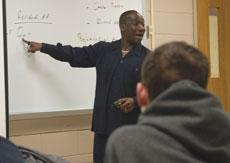Economics professor misses Ghana home, enjoys ‘rewarding’ career

Dr. Nii Abrahams teaches his Principles of Economics course in Plaster Hall April 11. Abrahams is from Ghana.
The apple didn’t fall far from the tree.
However, the “tree” is in the western African nation of Ghana and the “apple” landed at Missouri Southern eight years ago.
Dr. Nii Adote Abrahams, associate professor of economics and head of department of finance, economics and international business, spoke with emotion about his father and large family back in Ghana.
“My dad is my hero, the one I admire most,” he said. “He’s a gentleman and a scholar…a great father and a great person.”
Abrahams and his five siblings grew up near the campus of the University of Ghana, where his father worked in the department of economics.
“It was a fun place to grow up,” he said.
Education was different in Ghana but not necessarily better; it was more rigorous in Ghana but the choices are greater in the U.S.
He completed his undergraduate studies at the University of Ghana, then came to the United States and got his master’s degree at the University of Massachusetts and Ph.D. at Penn State University. His intentions were to return to Ghana to teach, but opportunities were better in the U.S. If he had not pursued teaching, he would probably work for the government or as a missionary.
In his youth, Abrahams wanted to be a medical doctor, but has no regrets. The reward he enjoys most in teaching is hopefully making a difference in the lives and futures of his students.
“Just to see light bulbs come on for students, or to see some student two years later who is doing very well,” he said. “It’s very rewarding.”
His favorite thing about Southern and the Joplin area is the atmosphere in the school of business.
“It’s a great place to work, ” he said. “…great people.”
He laughs as he recalls some of the original excuses he has heard from students regarding homework.
“My parents were moving and used my homework as packing paper, ” he said, quoting a former student.
This semester, Abrahams is teaching Principles of Economics, Micro, Business Statistics and Money and Banking.
Because of his Ph.D. in agricultural economics, he is involved in the school’s innovative new program of Ecolonomics.
He defines this field as, “The marriage of economics, politics and science into one coherent and tangible argument as to why we have to protect the environment.”
Speaking on the slow development of internal energy resources in the U.S., Abrahams explained that the price of gas is still low enough that it doesn’t impact the average person’s budget too much. It is his opinion that we need to cut down on consumption, quit driving gas-guzzling cars and get into more energy efficient homes.
“Eventually, we’ll get there,” he said. “It will take a big push from somebody or a huge crisis, but people want to drive their SUVs and feel safe in them.”
Considering the possible impact on the economy with a new U.S. president in 2008, Abrahams speculated that taxes may change and it may change the philosophy of doing business, but it will have little impact on the economy.
“The U.S. economy is strong…(it) is made up of people like you and me,” he said. “Small businesses make the economy go.”
He said the war has had an impact in that $100 billion have been spent and that money has trickled down into the economy.
In spite of all the technological advances of the 21st century, Abrahams does not believe that banking will ever be completely wireless.
“Part of banking has to do with looking someone in the face,” he said. “We want that eye-to-eye contact – that makes the difference.”
Abrahams’ “better half,” Faustina, is also a native of Ghana. She is employed at the student support center at Southern. She lets him cook occasionally, and he enjoys grilling and preparing native rice dishes. Their two boys, 12 and 14, were born in the U.S. and attend school in Carl Junction. He got an iPod for Christmas and, after his children listened to the music he loaded on it, they decided he was “too old.”
Outside the classroom, Abrahams is a “sports junkie,” tennis, golf, volleyball, basketball, all sports, but soccer is his passion.
To his family, his colleagues, and his students, Abrahams is a hero, a gentleman, and a scholar. Just like his father.
Your donation will support the student journalists of Missouri Southern State University. Your contribution will allow us to purchase equipment and cover our annual website hosting costs.



























